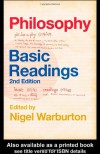Currently reading
Philosophy: Basic Readings
Against Method: Outline of an Anarchistic Theory of Knowledge
Arguably: Selected Essays
Philosophy of Science (Science & Mathematics) (Philosophy & Intellectual History)
David Mitchell: Critical Essays
 2.5 stars for the bad and unorganized writing.
2.5 stars for the bad and unorganized writing. I would recommend Pinker's The Blank Slate: The Modern Denial of Human Nature instead of this one. That book was a true delight.
 2.5 Stars
2.5 StarsThe idea of a an Unmoved Mover or better still a First Cause is fascinating. Just to think that everything has a cause(s) which itself has a cause(s) takes one to a journey backward which we may well be ill equipped to take. This book didn't do much in that domain however, but it rather explained our recent understanding of the cosmos and how from "nothingness" (though with quantum fluctuation which makes the whole idea of Krauss' "nothingness" problematic) a whole universe can come into existence. Frankly, I couldn't help finding the title inappropriate . However, it helped to clear some misunderstandings that I had about the multiverse and the inflation, though the examples he used were not-so-brilliant.
But, I was disappointed with the book because it made serious attacks against philosophy which in my view were unfounded or at best irrelevant especially that he mentions in this very book how Einstein (apparently one of his heroes) was influenced by Spinoza. Sean Carroll beautifully put it while commenting on Krauss' attacks on philosophy:
"The point of philosophy is not to be “useful” to science, any more than the point of mycology is to be “useful” to fungi".
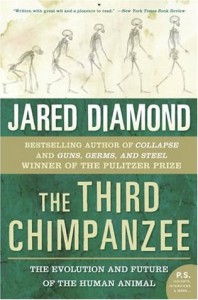 This was a very good book. Just the amount of topics Diamond intelligently delves into makes it worthwhile, with all of them being relevant to the title, namely The Evolution and Future of the Human Animal. It is true that the book is a bit outdated in relation to the dates of our evolution or the different theories postulated to explain human sexuality or certain traits, but it is nevertheless interesting and very important.
This was a very good book. Just the amount of topics Diamond intelligently delves into makes it worthwhile, with all of them being relevant to the title, namely The Evolution and Future of the Human Animal. It is true that the book is a bit outdated in relation to the dates of our evolution or the different theories postulated to explain human sexuality or certain traits, but it is nevertheless interesting and very important. In relation to Evolutionary Psychology (Sociobiology) for which this book is most renowned, Diamond examines the different theories that explain how we became social beings, how we lived most of our evolutionary history or what are the differences (if any) between male and female psychology, among several other topics. He is careful in tackling these question but at the same times asserts that even if the theories show that males for example, were more promiscuous in most of their evolutionary history than females, there is no cause for alarm, since science need not tell us how to behave in the first place. Our being alarmed is as strong an evidence that we are not bound by our genes and have almost unlimited control on our choices of how to live.
There were very touching moments in this book, especially when he speaks about other species (especially chimps) and how we contribute to their extinction even unknowingly. Also, a painful chapter was on genocide for which alone I would recommend the whole book. There was a whole and detailed chapter devoted to languages and how Indo-European languages became dominant in the world today, all this while debunking racist theories about the supposed “superiority” of the Indo-European language. Other important topics included were the environment and its conservation, extraterrestrial life, drug abuse and art.
A magnificent book on human evolution and future. Highly recommended.
 There is no doubt that Russell ignores some important elements in the history of western thought in his History of Western Philosophy. I am not as much annoyed as some who consider this book worthless for that matter. I may be biased toward him and the importance he gives to the scientific method in considering the various schools of philosophy. He obviously aims at a philosophy based on the scientific knowledge acquired at his time. However, I see it somewhat unfair to totally ignore some figures such as Kierkegaard or even the impact of Freud on philosophical thought when writing a history, and hence the 4 stars.
There is no doubt that Russell ignores some important elements in the history of western thought in his History of Western Philosophy. I am not as much annoyed as some who consider this book worthless for that matter. I may be biased toward him and the importance he gives to the scientific method in considering the various schools of philosophy. He obviously aims at a philosophy based on the scientific knowledge acquired at his time. However, I see it somewhat unfair to totally ignore some figures such as Kierkegaard or even the impact of Freud on philosophical thought when writing a history, and hence the 4 stars. Though non-comprehensive and outdated concerning the important scientific findings of the second half of the 20th century, this is a good introduction to philosophy and I will surely refer to it in the future. It is relatively easy and beautifully written and Russell's sense of humor is one of a kind.
 I'm ashamed to say that I didn’t know until recently (after reading Dawkins’ magnificent book The Ancestor’s Tale) that evolution can in fact be observed happening in real time and not only in as short a time as centuries, but also in decades and even years. In that book, Dawkins spoke about Rosemary and Peter Grant in relation to their work on the Galapagos Islands on Darwin’s finches and how they showed the role of evolution in explaining the immense diversity of life. I tried to find a book on the subject and came across this one, which was also mentioned in the Bibliography of The Ancestor’s Tale.
I'm ashamed to say that I didn’t know until recently (after reading Dawkins’ magnificent book The Ancestor’s Tale) that evolution can in fact be observed happening in real time and not only in as short a time as centuries, but also in decades and even years. In that book, Dawkins spoke about Rosemary and Peter Grant in relation to their work on the Galapagos Islands on Darwin’s finches and how they showed the role of evolution in explaining the immense diversity of life. I tried to find a book on the subject and came across this one, which was also mentioned in the Bibliography of The Ancestor’s Tale. First, there is a thing that I didn’t appreciate much in this book, and that is the style in which it was written. Scientific books with journalistic and literary tones annoy and distract me a lot and if it were not for that, this book would have easily earned a perfect 5 star. It is unique and intelligent, written sometimes with beautiful Dawkinsesque prose about the elegance and magnificence of evolution with beautiful allusion to the Judeo-Christian myths in a manner that didn’t suggest supernatural elements which can sometimes be imprudently used in scientific books. I actually quite liked that since I happen to find the Judeo-Christian myths of creation beautiful.
The Beak of the Finch had some very interesting ideas about the different paths evolution follows under different circumstances, such as when a species is being subjected to opposing selection forces by both sexual and natural selections, or when droughts and floods occur in successions. Also, one of the most interesting ideas was the fact that when zooming-in on the evolutionary history, the transition is often jagged and goes back and forth on the same or different paths. Another powerful idea was speciation and how it occurs without necessarily being always caused by geographical isolation. It only suffices that certain members of a species adapt to a different lifestyle from that of the others while living in the same environment, and given enough time the two groups can diverge to form different species following different lifestyles. And finally, demonstrating the role of hybridization in speciation was really interesting and informative.
The Beak of the Finch is not as much focused on finches as its title suggests. In fact, the author believes that the finch's beak can be used to symbolize evolution itself, given the powerful insights it gave the scientists who studied it since decades, and most importantly its historical significance because of Darwins' visit to the Galapagos. It is a delightful idea and symbol.
Evolution is indeed a fascinating and important topic and this book clearly shows how it is happening all around us. We like to think that it happened a long time ago and long stretches of time are needed for its latest effects to surface. Weiner shows how this is not always the case and how evolution can proceed with varying speeds under different conditions. He shows the extent of the effects of our actions on the evolution of almost all the species around us including of course our own. It is nice to remember that Heraclitus was right in saying that everything flows, which is not only true as regards the atoms of our bodies which are being replaced as I write these words, but also in relation to the changes that our species undergo as long as we have enough time, wisdom, and chance to be here.
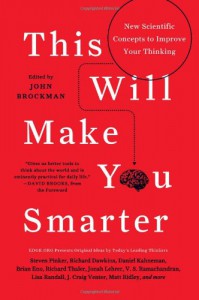 Most probably the title of this book is meant to be a joke. With the contributors of this book, I will almost certainly feel myself dumber.
Most probably the title of this book is meant to be a joke. With the contributors of this book, I will almost certainly feel myself dumber.
 There are some good examples in this book, in addition to some good science-fiction scenarios that were enjoyable and original, but I found it hurrying from topic to topic without much depth. There's nothing special here that can't be found in Dawkins' other book. If you still didn't read The Blind Watchmaker, or better still The Ancestor's Tale, I would suggest you opt for them as the topics he is talking about in this book are better treated in in the others and in the case of The Ancestor's Tale, they are more up to date.
There are some good examples in this book, in addition to some good science-fiction scenarios that were enjoyable and original, but I found it hurrying from topic to topic without much depth. There's nothing special here that can't be found in Dawkins' other book. If you still didn't read The Blind Watchmaker, or better still The Ancestor's Tale, I would suggest you opt for them as the topics he is talking about in this book are better treated in in the others and in the case of The Ancestor's Tale, they are more up to date.
 I'm watching the BBC documentary of this book and it is quite good. I got a good offer of it on Audible with a whopping 46,5 hours!
I'm watching the BBC documentary of this book and it is quite good. I got a good offer of it on Audible with a whopping 46,5 hours!
 After reading this book about 6 months ago, I decided to pick it up again. While the philosophy parts are still great (well, at least for someone who is still new to philosophy), I felt the story and especially the ending more awkward than I imagined it from my last reading. It could have ended in not just one, but many better ways in my opinion. However, it is still a favorite, especially that its core message as a book against pseudo-philosophy and superstition is still fresh and resonates with many book for which I hold high esteem.
After reading this book about 6 months ago, I decided to pick it up again. While the philosophy parts are still great (well, at least for someone who is still new to philosophy), I felt the story and especially the ending more awkward than I imagined it from my last reading. It could have ended in not just one, but many better ways in my opinion. However, it is still a favorite, especially that its core message as a book against pseudo-philosophy and superstition is still fresh and resonates with many book for which I hold high esteem.
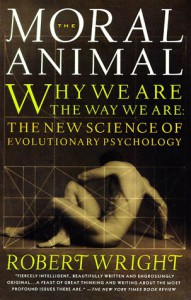 If you find yourself uncomfortable while hearing about genes for altruism or genes for retaliation..etc., then this book is for you. It will clear many misunderstandings about what is meant by a Selfish Gene. In fact, the book has many explanations that would have been good for Dawkins to include in later editions of his book The Selfish Gene or write about later. Like Dawkins' book, The Moral Animal talks much about altruism and how it can be understood in the new Darwinian light (based on kin selection and reciprocal altruism).
If you find yourself uncomfortable while hearing about genes for altruism or genes for retaliation..etc., then this book is for you. It will clear many misunderstandings about what is meant by a Selfish Gene. In fact, the book has many explanations that would have been good for Dawkins to include in later editions of his book The Selfish Gene or write about later. Like Dawkins' book, The Moral Animal talks much about altruism and how it can be understood in the new Darwinian light (based on kin selection and reciprocal altruism). The book is surely disturbing and Wright doesn't shy away from taking ideas to their logical conclusions. Many things are counter intuitive, like for example how monogamy is (contrary to the popular belief) good for men more than women, since in the former many men will be without wives but no women without husbands. He argues that monogamy was probably adopted lately in order to maintain social stability. It is a highly intelligent and earnest book. There's a beautiful technique used here by trying to explain Darwin's life (which is described by most as "saintly") in light of Evolutionary Psychology which I enjoyed immensely, with Darwin being the moral animal. However, like any science, some things are still speculative and need to be verified by data as Wright always reminds us.
Having said all this, I marveled at the first 300 pages or so of the book. It changed many of my views about Evolution which I took for granted. We want to think of ourselves as animals with an extra part controlling the animal. This is most certainly false. We are animals capable (but not efficient) of contemplating our being an animal. Our brains are battlefields between our nature and our nurture (unlike what "anti-genetic determinists" think about Evolutionary Psychology).
What I liked less in this book were the parts about Utilitarianism and how we can overcome our genetic tendencies. I agree with many Utilitarian ideas which I read elsewhere, but I was somehow disappointed here after the amazing explanations of Evolutionary Psychology. This part needed further elaboration and treatment, and some ideas were left midway. However, it is a great introduction to the topic and I highly recommend it. The first 300 pages easily deserve a 5-star rating.
 A truly great book.
A truly great book. What is Freedom? Ursula K. Le Guin gave what I believe to be the best answer to this question. She shouts about how Freedom is by no means synonymous to a risk-free life. It will absolutely entail hardship, heavy labor and insecurity. I remember once reading an interview with Chomsky where he was asked about Anarchism and how the Anarchist society might be. He answered that there are no ready-made answers to this question. He stressed that "we have to try and see". I found his "answer" courageous and insightful.
What a better place to talk about human nature and its yearning to be free other than an Anarchist society. The book was a heavy read and at times overly descriptive. As I read, I realized that I have many unanswered questions about the life and dangers in Anarres (the Anarchist society in the book) and I was slightly annoyed by this and mistakenly took it as a weakness by the authoress. Then it dawned on me that this is precisely the point of the book: you don't be an Anarchist because you choose to be one, you just shatter the walls around you and return to your normal state. Anarchism is not a choice about "enhancing" the well-being of human lives, it is just the rejection of authority, whatever risks and woes that might entail.
 This was certainly a better book than The Happiness Hypothesis: Finding Modern Truth in Ancient Wisdom, which sometimes had a feel-good-inc tone. I almost agree with all the ideas of Gilbert when it comes to happiness, though I didn't find all his experimental data decisive. Why I loved the book? I believe it makes very good sense. The beauty of it is that it doesn't need experiments to back it up. You know in your heart that what he is saying is true.
This was certainly a better book than The Happiness Hypothesis: Finding Modern Truth in Ancient Wisdom, which sometimes had a feel-good-inc tone. I almost agree with all the ideas of Gilbert when it comes to happiness, though I didn't find all his experimental data decisive. Why I loved the book? I believe it makes very good sense. The beauty of it is that it doesn't need experiments to back it up. You know in your heart that what he is saying is true. The main idea in this book is that we exaggerate how happy or sad we would feel when we contemplate certain scenarios about our futures. This happens because although we think we are simulating an event which lies in the future, we are not doing that at all. Our conception of future events cannot escape the influence of a) Our view of the world in the present moment b) Our memories of past event which are almost always distorted.
The book is well written, humorous (though sometimes he overdoes it) and interesting to read. It is not a self-help book, and sometimes even pessimistic about how we are bound to make the same mistakes again and again. There is an advise about how we can try to avoid making mistakes about our futures experiences which is pretty straightforward and convincing: we should seek the advise of those who are at the present living the futures we are visualizing for ourselves. However, this may not always be possible, especially if you are contemplating a future which is unique enough as not to find anyone to ask about it, not to mention those who aren't honest enough with you or themselves to share their experiences, which is sad but true. So, there no major advise here about how to become happy and hence the book's title which says it all. I can assure you that the happiest moments in my life were neither planned, nor expected. They were moments that I just stumbled upon.
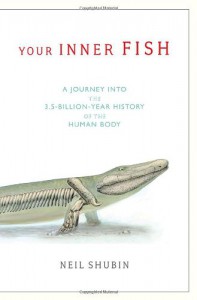 I knew about this book from Trevor's review some time ago. I saw it in the Bibliography of some of Dawkins' books and it that of Why Evolution is True by Jerry A. Coyne which I recently read, and I got interested to read it very soon. It is truly a remarkable work. If not for anything, just because it shows how evolution can be very helpful in making advances in Medicine. Neil Shubin, who is very well versed in Comparative Anatomy, shows how certain parts of our body can only be understood in light of our evolutionary history. It changed how I see myself and Homo Sapiens in great degree. If you want to understand what scientists mean when they say the literally true and beautiful statement "we are all of the same family", then you really need to read this book.
I knew about this book from Trevor's review some time ago. I saw it in the Bibliography of some of Dawkins' books and it that of Why Evolution is True by Jerry A. Coyne which I recently read, and I got interested to read it very soon. It is truly a remarkable work. If not for anything, just because it shows how evolution can be very helpful in making advances in Medicine. Neil Shubin, who is very well versed in Comparative Anatomy, shows how certain parts of our body can only be understood in light of our evolutionary history. It changed how I see myself and Homo Sapiens in great degree. If you want to understand what scientists mean when they say the literally true and beautiful statement "we are all of the same family", then you really need to read this book. One thing I didn't like was that Shubin wasn't consistent in the level of details of his topics. Sometimes, when I wanted to know more about a thing like Embryology, he stopped short and picked up a different topic. He also begins the chapters by telling a personal anecdotal about how he and his colleagues found certain fossils (like the famous Tiktaalik) which was kinda boring for me. But apart from these passages, it was a joy to read. Especially the chapter before the Epilogue called The Meaning of it All. To know how much of our bodies is shared with Sharks, Flies and Tadpoles is truly breathtaking. To know the answers questions such as why we have hiccups, or why the male testes travel to the scrotum, or why we like fatty food is truly mind blowing. It was indeed a remarkable book which I will absolutely recommend to Evolution enthusiasts.
 This book had its moments, but on general, it pains me to say that it was mediocre. Now when I'm thinking about it, some great quotes are coming to my mind, but that's all, and hence the three stars.
This book had its moments, but on general, it pains me to say that it was mediocre. Now when I'm thinking about it, some great quotes are coming to my mind, but that's all, and hence the three stars. I am a strong admirer of Dostoyevsky. His The Brothers Karamazov and Crime and Punishment took my breath away with their beauty and insight. I would be interested to know what Dostoyevsky thought about this book (If someone knows then please comment), because I think it's quite different from his other works. In the Idiot, the main character is so detached from reality, that you wonder sometimes what is it that you'll get away from this book. There's a beautiful quote in this very book which explains what I'm trying to say. (Podkoleosin is a character in Gogol's comedy, The Wedding).
"Authors, as a rule, attempt to select and portray types rarely met with in their entirety, but these types are nevertheless more real than real life itself.
"Podkoleosin" was perhaps an exaggeration, but he was by no means a non-existent character; on the contrary, how many intelligent people, after hearing of this Podkoleosin from Gogol, immediately began to find that scores of their friends were exactly like him! They knew, perhaps, before Gogol told them, that their friends were like Podkoleosin, but they did not know what name to give them.
Raskolnikov, Ivan, Alyosha, Dimitri and Smerdyakov are indeed profound real-life characters, but Myshkin in my view is nearly non-existent. At least in the world as I see it. Some may say that he is quite like Alyosha, but I disagree. Alyosha, unlike Myshkin, acknowledged evil and dealt with it in his own fashion, which made him such a profound character.
While reading the book, I realized that I was not connecting with all the characters and not just Myshkin. When I read the quote aruond the end, I realized what was precisely the problem. Ironic that it is his insight that helped me fully understand why I didn't like the book as much as his other works. Should I rate it more than 3 stars?
 Well, who would want to miss all Manny's review which are sometimes more delightful than the books reviewed? Sure it's not me!
Well, who would want to miss all Manny's review which are sometimes more delightful than the books reviewed? Sure it's not me!
 This is a remarkable book. It is written by someone who is really interested in educating people and not just laying out facts. I loved the tone of the author and am now following his blog Why Evolution is True which is really interesting and amusing (this guy really loves cats!). He almost daily posts lots of interesting facts about evolution.
This is a remarkable book. It is written by someone who is really interested in educating people and not just laying out facts. I loved the tone of the author and am now following his blog Why Evolution is True which is really interesting and amusing (this guy really loves cats!). He almost daily posts lots of interesting facts about evolution.There's a good YT video about this book that people may be interested in seeing before reading the book
http://www.youtube.com/watch?v=w1m4mATYoig
Before buying this book, I read some bad reviews about it from people who said that the tone of the author was aggressive and he was really obnoxious. This is certainly not the case. After hearing what some say about Dawkins (whom I personally calm and convincing) being aggressive and obnoxious and about Coyne, I came to the sad conclusion that some will really get offended no matter how you write about evolution. It could be that people like Hitch may sometimes be offensive, but Dawkins or this guy Coyne, they are serious people interested in education other than paying lip service. Anyway, the author shows how natural selection operates and drives life by demonstrating some of the most interesting stuff about evolution of different species. There is a chapter about embryos and especially how the human evolution can be traced by the different stages that our embryo undergoes which made me shudder.
People who are very familiar with evolution may find some of ideas in this book repetitive, but there is certainly some new stuff here. I read both The Selfish Gene and The Blind Watchmaker and was still amazed by many interesting facts, so I recommend it, especially to those who want an easy and brief introduction to evolution.
